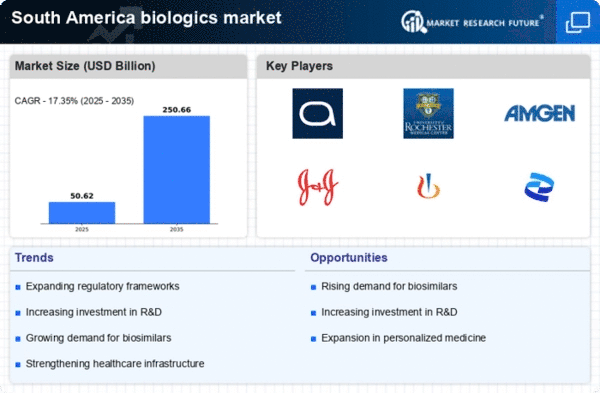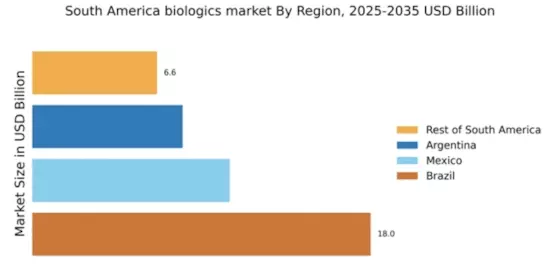Growing Focus on Rare Diseases
The growing focus on rare diseases is emerging as a critical driver for the biologics market in South America. With an estimated 7,000 rare diseases affecting millions of individuals, there is a pressing need for targeted therapies. Biologics have demonstrated significant potential in treating these conditions, leading to increased investment in research and development. The market for rare disease treatments is projected to grow substantially, with biologics expected to capture a significant share. This trend is prompting pharmaceutical companies to prioritize the development of biologics tailored for rare diseases, thereby expanding the overall biologics market. As awareness and advocacy for rare diseases increase, the demand for innovative biologic therapies is likely to rise, further propelling market growth.
Increasing Healthcare Expenditure
The rising healthcare expenditure in South America is a pivotal driver for the biologics market. Governments and private sectors are allocating more funds towards healthcare, which is expected to reach approximately $500 billion by 2026. This increase in spending facilitates the development and accessibility of biologics, as healthcare providers seek innovative treatments to improve patient outcomes. The biologics market in South America is likely to benefit from this trend, as more resources are directed towards advanced therapies. Furthermore, the growing prevalence of chronic diseases necessitates the adoption of biologics, which are often more effective than traditional therapies. As healthcare budgets expand, the biologics market is poised for significant growth, potentially leading to a more robust healthcare infrastructure across the region.
Rising Incidence of Autoimmune Diseases
The increasing incidence of autoimmune diseases in South America is a significant driver for the biologics market. Conditions such as rheumatoid arthritis, lupus, and multiple sclerosis are becoming more prevalent, prompting a greater need for effective treatment options. Biologics have shown promising results in managing these diseases, leading to a surge in demand. According to recent estimates, the autoimmune disease market is projected to reach $50 billion by 2027, with biologics accounting for a substantial share. This trend indicates a growing recognition of the efficacy of biologics in treating complex conditions, thereby driving investments and research in the biologics market. As healthcare providers seek innovative solutions, the biologics market is expected to expand in response to this rising demand.
Collaborations and Partnerships in Research
Collaborations and partnerships among pharmaceutical companies, research institutions, and universities are fostering innovation in the biologics market. In South America, these alliances are crucial for advancing research and development efforts, particularly in the field of biologics. By pooling resources and expertise, stakeholders can accelerate the discovery of new biologic therapies and improve existing ones. This collaborative approach is likely to enhance the competitiveness of the biologics market, as companies leverage shared knowledge to bring products to market more efficiently. Furthermore, such partnerships often lead to increased funding opportunities, enabling more extensive clinical trials and research initiatives. As the landscape of biologics evolves, these collaborations will play a vital role in shaping the future of the market.
Advancements in Biomanufacturing Technologies
Technological advancements in biomanufacturing are transforming the biologics market in South America. Innovations such as continuous manufacturing and process intensification are enhancing production efficiency and reducing costs. These advancements enable manufacturers to produce biologics at a larger scale while maintaining quality and compliance with regulatory standards. The market is witnessing a shift towards more sustainable practices, with biomanufacturers adopting greener technologies. This not only reduces the environmental impact but also aligns with the increasing demand for eco-friendly products. As a result, the biologics market is likely to experience accelerated growth, with companies investing in state-of-the-art facilities and technologies to meet the evolving needs of the healthcare sector.

















